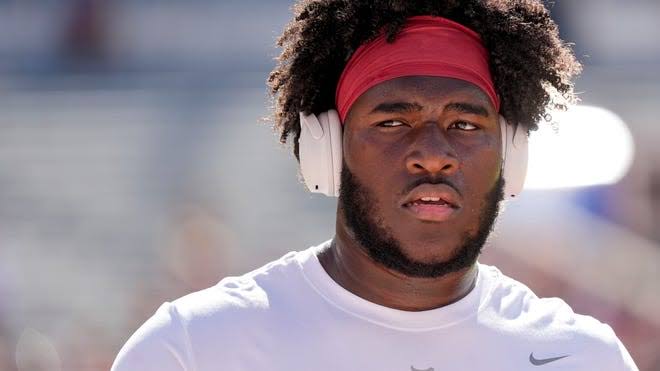Alabama OL Tyler Booker Sounds Off on Transfer Portal Departures: “You’re Not Playing for a Reason”
The transfer portal has become one of the most polarizing aspects of college football in recent years, offering athletes unprecedented freedom to switch programs while also generating widespread debate about its impact on the sport. Alabama offensive lineman Tyler Booker, one of the Crimson Tide’s most vocal leaders, weighed in on the issue following a wave of transfer departures from the program. His candid comments shed light on the realities of competition at an elite program like Alabama and the mindset required.
The NCAA transfer portal, introduced in 2018, has transformed the landscape of college football. While it provides players with the opportunity to seek better opportunities elsewhere, critics argue that it can undermine the value of perseverance and development. Alabama, under head coach Nick Saban, has been no stranger to both the benefits and challenges of the portal. While the program has attracted top-tier talent through the portal, it has also seen players depart, seeking more playing time or a fresh start elsewhere.
Recent departures from Alabama’s roster have sparked conversations among fans and analysts about the reasons behind such moves. For Booker, however, the explanation is straightforward: competition at Alabama is relentless, and not everyone is cut out for the grind required to earn playing time.
Speaking to reporters after a recent practice, Booker didn’t mince words when addressing the wave of players entering the portal. “You’re not playing for a reason,” he said bluntly. “It’s not because the coaches don’t like you or because someone’s out to get you. It’s because someone else is outworking you or performing better on the field. That’s just the reality at Alabama.”
Booker, a standout offensive lineman for the Crimson Tide, knows firsthand the level of competition required to succeed under Nick Saban. A former five-star recruit, Booker entered Alabama with high expectations and quickly earned his place on the starting line. His success, however, didn’t come without challenges. Like many players, he had to navigate the steep learning curve of playing at one of college football’s premier programs.
“At Alabama, nothing is handed to you,” Booker explained. “Every day is a battle, and that’s what makes us great. If you’re not willing to embrace that, this might not be the place for you.”
While Booker’s comments may come across as harsh to some, they reflect a broader philosophy that has defined Alabama football under Nick Saban: the “Process.” This mindset emphasizes personal accountability, relentless effort, and a focus on long-term development. For players who buy into the system, the rewards are evident in the program’s consistent success and its reputation as a pipeline to the NFL.
However, not every player thrives in this high-pressure environment, and the transfer portal provides an escape hatch for those seeking a different path. Booker acknowledged the benefits of the portal but cautioned against using it as a shortcut. “If you leave without putting in the work, you’re not solving the problem,” he said. “You’re just running from it.”
Booker’s comments also underscore the importance of team culture in sustaining success at Alabama. With so many players competing for limited spots, maintaining unity and a shared commitment to the program’s goals can be a challenge. Yet, Booker believes that the departure of players who aren’t fully committed can ultimately strengthen the team.
“If someone’s heart isn’t in it, it’s better for them to move on,” he said. “We need guys who are all-in, who are willing to fight for their spot and push their teammates to be better. That’s what makes us a championship team.”
Booker’s remarks are part of a larger conversation about the role of the transfer portal in college football. While it has provided players with more agency, it has also raised questions about the balance between opportunity and accountability. For programs like Alabama, which thrive on competition and development, the portal can be both a blessing and a curse.
On one hand, it allows teams to address immediate needs by bringing in experienced players. On the other hand, it can disrupt the development pipeline by encouraging younger players to leave before they’ve fully matured. For Booker, the solution lies in cultivating a mindset of resilience and dedication among players, regardless of the challenges they face.
As the college football landscape continues to evolve, the transfer portal will remain a key factor in shaping team dynamics and player development. For Alabama, the focus will continue to be on building a culture that rewards hard work and perseverance. Tyler Booker’s comments serve as a reminder that success at the highest level requires more than just talent—it demands commitment, resilience, and a willingness to embrace competition.
For the players who remain at Alabama, the message is clear: every day is an opportunity to prove yourself and earn your place. For those who choose to leave, the portal offers a chance for a fresh start, but it also serves as a reflection of the challenges inherent in competing at one of college football’s most storied programs.
As Booker put it, “At the end of the day, it’s all about how much you want it. If you’re willing to fight for it, there’s no better place to be than Alabama.”
